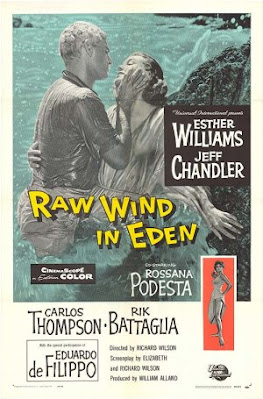"This is just a question -- not the bell for the next round." -- Laura
"What are you doing here? You belong on an island with nobody on it." -- ditto
Laura with no last name, the oldest fashion model in the world (Esther Williams was nearing forty when she made this film) is in Rome when she gets a visit from her married lover's lawyer, Wally Drucker (Carlos Thompson). She decides to return home with him in his plane, but they make a crash landing on a small island located near Sardinia. The only inhabitants of the island are Urbano (Eduardo De Filippo) and his daughter, Costanza (Rossana Podesta), who is betrothed to a strange man named Moore (Jeff Chandler), who came to the island seeking peace and isolation and never left. As Laura and Wally try to fix up a yacht to take them off the island, Laura and Moore find themselves attracted, even as strange acts of sabotage occur on the boat, and Costanza's handsome ex-lover, Gavino (Rik Battaglia), shows up now and then in his rowboat gunning for Moore. Laura makes up her mind to find out exactly who "Moore" is and where he comes from.
 |
| Carlos Thompson and Esther Williams |
Verdict: The only memorable thing about this tedious mess is the title. *1/2.














